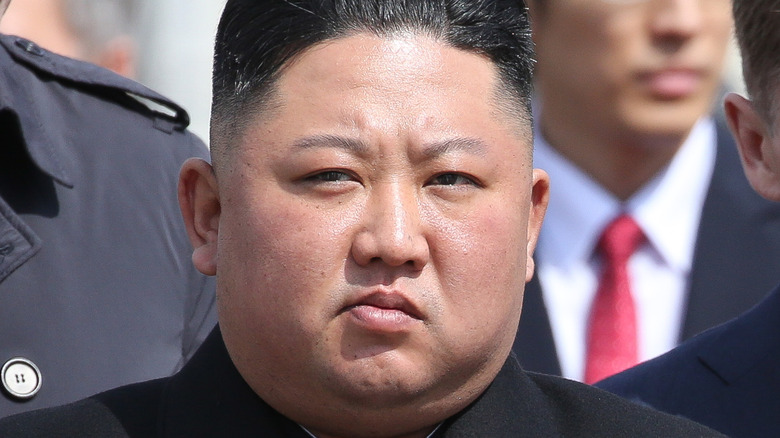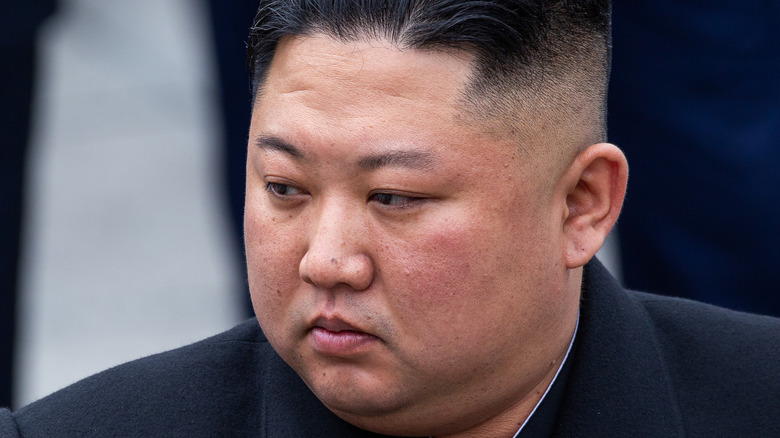Surprising Things That Could Get You Executed In North Korea
North Korea is arguably the most autocratic country in the world, ranking dead last on The Economist's Democracy Index behind the Democratic Republic of the Congo, the Central African Republic, and Syria — a ranking it has held in every year since The Economist began publishing the index in 2006. Unsurprisingly, the regime also has some of the harshest punishments on Earth, with public executions still carried out for offenses that would barely attract notice in first-world countries (via Amnesty International).
Though the country is shrouded in a degree of secrecy unlike anywhere else on the planet — it does not allow access to independent human rights reporters, according to Amnesty International — what is known about the state's system of crime and punishment is incomparably punitive. In one recent example, it was reported a North Korean smuggler was sentenced to death for distributing copies of the hit South Korean show "Squid Game," according to Variety. The show features a character who is a desperate North Korean defector.
Crime and punishment under the Kims
North Korean authorities have long told human rights observers at Amnesty International that the death penalty is rarely used in their country, and only for the worst crimes. Indeed, the death penalty is likely used less in North Korea than in Iran, Iraq, or Saudi Arabia, according to estimates by outside groups (via The Guardian).
But North Korean defectors usually paint a different picture, offering reports of common and terrifying public executions to South Korean NGOs such as The Transitional Justice Working Group (via Los Angeles Times). According to the organization, the offenses that warranted execution were often as minor as stealing a cow, stripping wire from a power line, or watching South Korean television. Most of these executions were carried out by firing squad, according to the report, and attracted large crowds of onlookers, making North Korea one of the few countries to still perform capital punishment for public spectators.
Publicly executed for stealing wire
Kang Chun Hyok, a North Korean defector now living in Seoul, told Los Angeles Times that he saw an execution at the age of just 9 or 10, alongside a crowd of hundreds of others. The man he saw killed was executed by the military for stealing copper wires from power lines owned by the state. "I was curious, and wanted to pick up shell casings. But I was shocked," Kang said. "The scene was so real; I was so young."
Kang Chun Hyok isn't alone — 80% of North Korean refugees interviewed by The Transitional Justice Working Group have seen a public execution, and half of the refugees said they had been forced to watch one. According to the watchdog organization, North Korea maintains this practice as a deterrent, and as a means for social control.
"It's a clear tactic, it serves a purpose," said Sarah Son, a Transitional Justice Working Group researcher, to the Times. "It maintains that culture of fear, it asserts regime control, it reminds people that certain crimes are not tolerated."
Killed for stealing rice
Officially, North Korean law restricts executions to anti-state activities, such as "suppressing the national-liberation struggle" or terrorism, as well as "particularly serious cases" of murder, according to a recent Amnesty International report.
In reality, according to defectors interviewed by Amnesty, the crimes were usually apolitical, and for offenses as minor as stealing rice. There are other apparent discrepancies in what North Korean law says and how it is enacted. Interpretations of the law published by North Korean authorities maintain that capital punishment will eventually be abolished in the country and that its current use is employed only as a last resort. But Amnesty International found that almost all North Koreans they spoke to had seen or knew of public executions.
The Amnesty International report gathered information about 16 public execution events (of at least 23 people). Half of the executions were for crimes involving accusations of murder. The other offenses included crimes as serious as sexual assault or domestic violence and as minor as theft or "banditry." Though almost all the executions were of men, according to Amnesty International, there was a report of an execution in 1988 of a woman accused of stealing money from the restaurant where she worked.
The death of a college student
Foreign nationals visiting North Korea have sometimes faced horrific punishments for minor crimes — in recent years, visitors from the United States, South Korea, China, and Canada have all been imprisoned by the authoritarian state, according to The Guardian.
In late 2015, the 21-year-old American Otto Warmbier traveled to North Korea on a three-day group tour from China, where he was studying abroad (via BBC). On the last day of his trip, the University of Virginia junior was arrested by North Korean authorities for allegedly taking down a propaganda poster of Kim Jong-il from the hotel at which he was staying. The supposed video of the incident, as released by North Korea, is grainy and does not clearly identify the perpetrator.
Warmbier was not sentenced to death for the theft — his official punishment was 15 years of hard labor. He never completed his sentence. After seventeen months of captivity, Warmbier was sent back to the United States in a coma. He died a week later.
North Korean authorities claim that his death was due to taking a sleeping pill and contracting botulism. But Warmbier's family believes that his death was the result of torture. Otto fell into his coma soon after his sentencing — a year before he was released. During that time, North Korea never revealed his condition.
The actual circumstances of his death remain mysterious, and doctors have said there was no sign that he was physically abused while in captivity.




